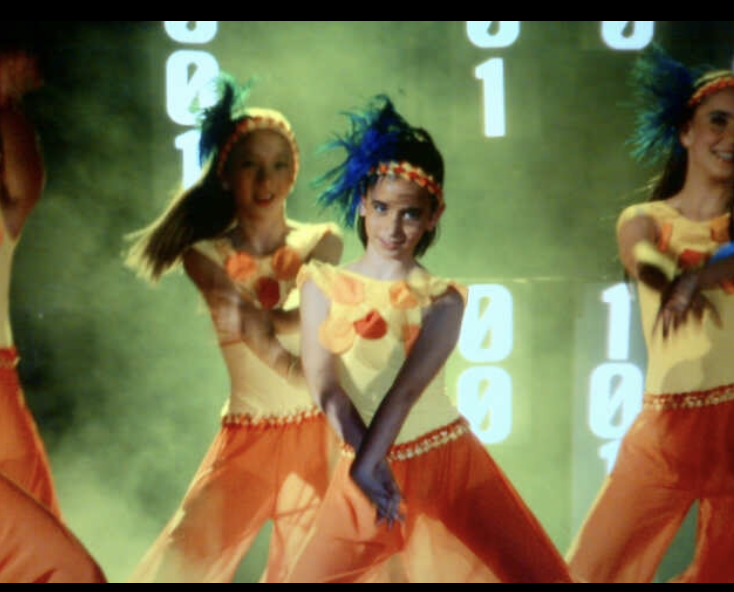Dancing is exhibited as art, criticized in the same manner, and has the power to evoke the same emotions as art does. The difference is that it requires the same, if not more, physical activity than any other sport. Hence, it has the same physical benefits as a regular exercise and working as the mental outlet art is considered to be.
Like most kids, I participated in different extracurricular activities my parents would sign me up. Eventually, like everyone else, once I grew up – I also grew out of those activities. The only activity that has never become boring is dancing. Although I had to quit it when I was 14 because of the extensively time-consuming rehearsals, I was never able to let it go. I would sign up for random dance classes that didn’t require much commitment, or I’d learn dance routines in my house from music videos. I didn’t know how to explain it before, but dance has always made me feel better regardless of the situation.

This is a picture of me in my first big competition, and I can proudly say I still know the routine for that dance even though it was over ten years ago.
Through-out high school, which was when my classes started getting harder, and I starter to develop stress patterns, I took dance as an elective all four years. I did notice I felt more relaxed in the class that would follow after the hour of dance than in any other one. Looking back, I did better on tests for that class, and I wouldn’t have as much test anxiety compared to the other classes. I also realized that when I feel overwhelmed from studying, and I need a break if I take a small break to dance and then come back; I am immediately more at ease and focus better on my homework. Dr. Iris Brauninger helps explain why dancing has such an effect on our quotidian life through her article “Dance Therapy for Anxiety”. Brauninger points that, Because, dancing brings us to a primitive state, we are consequently more liberated; she also highlights that the mechanics of breathings along extensive movement help release the mind of hyper-aroused thoughts. (Brauninger, 2016). Previous to this, Sabine Koch organized an experiment to see the effect of dancing on a psychological level. Koch’s experiment shows the positive results dance can have in many psychotic related illnesses such as PTSD, alongside a decrease in anxiety and depression levels (Koch, 2013). This is because dance, like many physical activities, releases serotonin, which is responsible for increasing someone’s “happy” mood (Koch, 2013). However, dance is also an art, so the right hemisphere of the brain is also activated. A study conducted by Mi Li shows that patients with no activity in the right hemisphere of the brain suffer from full depression. (Li, 2018).

Here are the results for anxiety in Sabine Koch’s experiment where we can see a significant decrease in anxiety level for most of the subjects. Koch also announces that the subjects noticed much less test anxiety while the study took place.
Dancing is the only activity that has the same advantages that a physical sport has on our physical health. But because dance dives into the artistic medium, it also employs the advantages that art brings to our mental health. In the future, I would like to apply these techniques, and focus them on lowering my anxiety. So maybe I will start dancing before my exams!
Work cited
Mi Li, Hongpei Xu, Shengfu Lu,2018 Jun 5. Neural Basis of Depression Related to a Dominant Right Hemisphere: A Resting-State fMRI Study. Behavioural Neurology. Available from: internet, https://www.hindawi.com/journals/bn/2018/5024520/
Iris Bräuninger. 2016 Feb 10. Dance Therapy Can Alleviate Anxiety. Anxiety.org]. Available from: internet, https://www.anxiety.org/what-is-dance-movement-therapy
Koch Sabine, Kunz T, Lykou S, Cruz R. 2013 Oct 26. Effects of dance movement therapy and dance on health-related psychological outcomes: A meta-analysis. The Arts in Psychotherapy. Available from: internet, https://www.sciencedirect.com/science/article/pii/S0197455613001676
I have recently been interested in dancing and I dance almost every day now. I feel exactly as you do that it is physically active and I feel energetic after dancing. Therefore, I would concentrate more when I get back to study and do other things. It is also interesting to learn that dancing can possibly decrease anxiety, depression, and other psychotic related illnesses. I will highly recommend dancing to people who might need a way to release stress.
I really enjoyed the personal perspective that you brought into this post! I too was one of those kids who spent years and years taking dance classes. Although I slowed down as high school approached, I still danced in musicals and looked forward to the performance aspect. Dancing always relieved my stress as it did for you, and I think it is really fitting that serotonin increases after we dance. I sometimes dance before exams to calm my nerves!